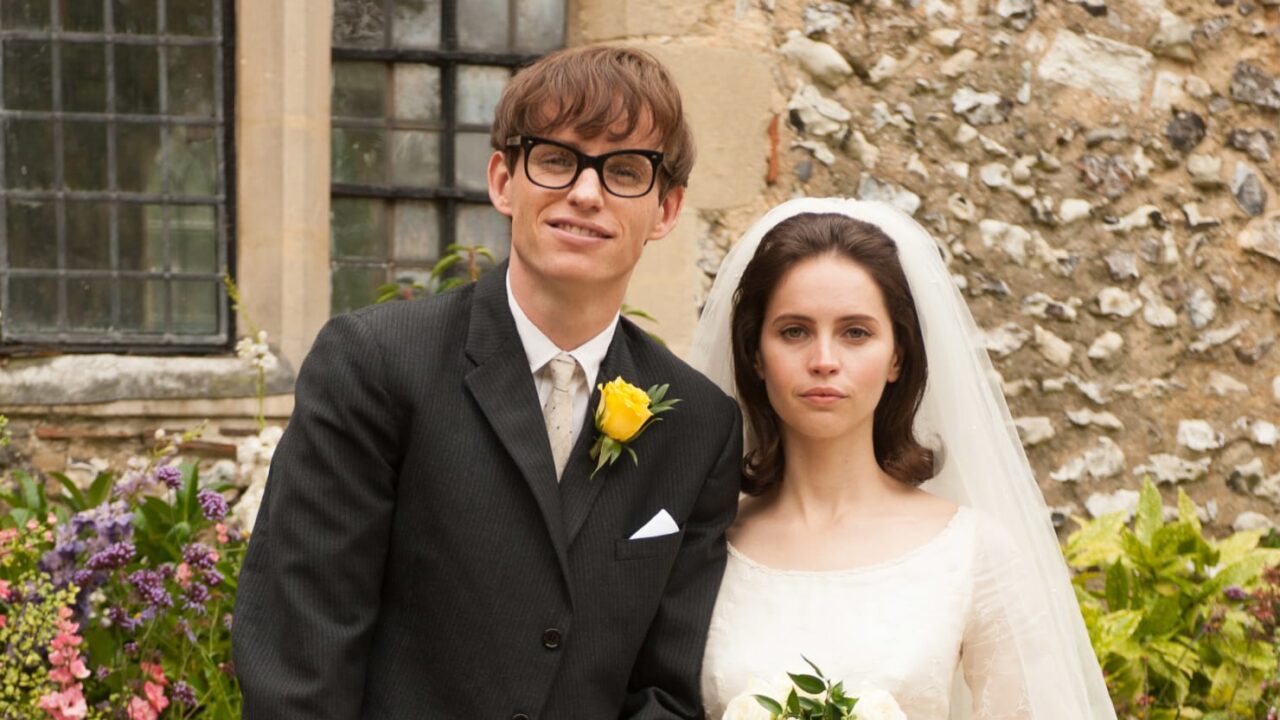This review originally ran on November 6, 2014
This week, we remember the late Stephen Hawking as well as the late Oscar-winning composer Jóhann Jóhannsson by running our initial review for the 2014 biopic, The Theory of Everything.
We will forever remember these two profoundly influential, brilliant, and inspiring men. Rest in peace.
I am usually drawn to biopic films for a number of reasons. I appreciate any actor’s attempt to become another real-life figure. I especially admire their willingness to be overly-critiqued for taking on that part when the literal person to draw reference against can be so easily accessed and therefore allow us to easily pick out those flaws in the performance. And what could be more daunting of a task than portraying one of the most brilliant men to have ever lived, as Eddie Redmayne does in the Stephen Hawking biopic, The Theory of Everything? Much to my surprise – and delight – the powerhouse performances, beautiful camerawork, and emotional score make this film nearly critique-less.
The Theory of Everything tells the true story of how Hawing met and fell in love with his first wife. The film begins with young Stephen, (Eddie Redmayne) who meets young Jane (Felicity Jones) at a University gathering. Wide-eyed and naive, the two quickly fall in love. Jane, being an artistic and religious girl, and Stephen, being the nerdy astrophysicist and atheist, exemplify how “opposites attract,” and realize that their future will know no bounds. But when 21-year-old Stephen is suddenly hit with a diagnosis of the motor neuron disease ALS (or, Lou Gehrig’s disease) and a two-year life expectancy, the couple doubles down on their commitment to each other and are soon married, with children on the way. All the while, Hawking continues to work towards his life’s grander purpose: to discover an equation to explain the creation of the universe as understood by time’s mathematical properties. His motivation to determine the relationship between space and time keeps him distracted from his debilitating disorder, but it’s easy to see that it is Jane’s love and support that truly keeps him alive.
‘The Theory of Everything’ isn’t a giant history lesson meant to educate audiences about the work of Stephen Hawking. Rather, it is a purely heartfelt look into the romanticism of his life.
I was awestruck at the execution and total mastery of Eddie Redmayne’s performance as Hawking, who portrays the mathematician throughout his entire life in his ever-weakening condition (Redmayne would go on to win the Academy Award for Best Actor). Redmayne captures this challenging period in time with real bravado: he finds the humor in the grim, the joy in the sadness, and the brilliance in the silence. Not to be outdone is Felicity Jones, who grounds the film with her selflessness and agitated, yet calm demeanor. Jane is a woman to be admired, and Felicity plays her with poignant sensitivities and warmth.
Director James Marsh, whose previous films include the documentary Man on Wire, focuses on the lovely, yet complex, relationship between Stephen and Jane. Marsh humanizes the man we have all come to know as a somewhat mythical figure in history and paints him in a new, more vulnerable and unseen light (and had the blessing from the real Hawking). The accompanying score by composer Jóhann Jóhannsson is the threaded heartbeat of the film, cinematic enough to transport us to another place and time but not so apparent that it takes away from the film itself.
The Theory of Everything isn’t a giant history lesson meant to educate audiences about the work of Stephen Hawking. Rather, it is a purely heartfelt look into the romanticism of his life. The film is emotional enough on its own, but given the recent passing of both Hawking and Jóhannsson, it plays with an even heavier tone. If you haven’t seen The Theory of Everything yet, now is the perfect time to do so.
Morgan Rojas
Certified fresh. For disclosure purposes, Morgan currently runs PR at PRETTYBIRD and Ventureland.

